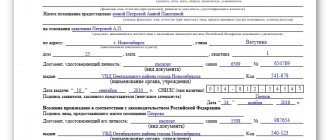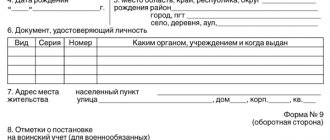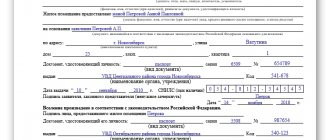Moving into an apartment, moving into a living space is not an easy task. Are you the owner or tenant of a residential property? Practice shows that having legal grounds for living in an apartment is not enough! It is not uncommon to have to defend the right to living space, constantly confronting negligent neighbors or former residents (owners or tenants).
Our housing lawyer will provide consultation on the issue of moving into residential premises and will be your representative until the court decision is implemented in its final form.
When disputes arise about moving in
Judicial and legal practice lists frequently occurring conflict situations between citizens regarding cohabitation and operation of real estate:
The owner of the apartment is not allowed into the rooms. This happens when relatives, friends, or acquaintances of the ex-wife who have a residence permit stay in the house, if the apartment after its acquisition remains occupied by the previous owner's registered residents, or if the room is rented out (users do not allow free access to the apartment by the owner).- The owner of part of the property is not allowed into the apartment. Other co-owners or temporary residents who have received the prerogative of exploitation under a lease agreement can create barriers to visiting and using the residential area.
- The person registered in the house is not allowed into it.
In the latter case, before filing a claim to move into a residential premises, the applicant is advised to make sure whether he has legal grounds for registration and whether they are relevant. A striking example is the case when a person serving a sentence returns from prison to his previous registration address, and other people who have bought real estate already live there.
Who has the legal right to move in?
Preference for moving into municipal housing is primarily given to the citizen (tenant) with whom the municipality has entered into a social tenancy agreement. According to Article 70 of the Housing Code of the Russian Federation, the tenant has the right, with the approval of the owner, to accommodate members of his family in the apartment. Moreover, the placement of minor household members does not require the consent of the owner.
If the property is privately owned, then a different settlement algorithm applies. The right arises on the basis of ownership of the living space or part thereof, and tenants can also live in the house under a rental agreement.
If the matter concerns privatized space, then the legal basis for its use by persons who have written a refusal to participate in privatization should be taken into account.
Procedure for moving into residential premises
The procedure may look different depending on a number of factors:
- If the property is owned by the municipal government, then a special procedure for moving into the residential premises applies. Initially, there must be a legal justification - the conclusion of a social tenancy agreement. Members of his family have the right to live in rooms in addition to the tenant. After the parties sign the agreement, it specifies the persons moving in with the tenant. The owner of the room issues a reference permit for registration and check-in. Only after this the tenant and his family have the right to obtain registration.
- To access and use a privately owned home, it is necessary to obtain the consent of all co-owners. If one of them expresses a categorical refusal, then the court does not have the right to recognize it as unlawful even if there is no motivation for such a denial. It is worth noting that the prerogative of a minor owner of a share does not provide a guarantee of preferential use of his parents’ house.
The authorities have the right to refuse occupancy if the area of the home is small (the area per family member is less than the norm when moving in a new tenant). However, there is an exception to the rule regarding the employer’s spouse and young children.
Moving into a municipal apartment
The process of moving in involves not only gaining physical access to a residential premises, but also acquiring certain rights to real estate. It must be taken into account that for different types of residential premises it is necessary to comply with special occupancy regulations. Municipal apartments are allocated to citizens on social rent terms.
The provision of housing on the specified grounds occurs according to the rules regulated by the Housing Code of the Russian Federation. To move in, tenants need to consider the following nuances:
- the allocation of residential premises under social rent occurs in the order of priority (for this, citizens must contact the local government authority and register);
- housing is provided for all family members on the waiting list;
- When concluding a social rental agreement, housing remains in municipal ownership, and citizens are deprived of the opportunity to independently manage the apartment.
This status of residential premises imposes significant restrictions on the procedure for moving in and registering citizens. Without the permission of the landlord, i.e. authorized municipal body, only family members can move into municipal housing. They include the spouse after the marriage has been formalized; minor children, a number of other persons recognized as a member of the employer’s family.
According to the terms of social rent, simultaneously with moving in and registering at the place of residence, citizens will also acquire the right to permanent use of the apartment. This means they can be forcibly evicted only on the grounds expressly specified in the law. For example, according to the Housing Code of the Russian Federation, this is allowed when a significant debt has formed for more than 6 months in a row, when systematic and gross violations of the rules for using housing are identified, and in a number of other cases.
Find out more Common shared ownership
It is possible to move other persons who are not part of the family into municipal living space only with the consent of the landlord. This rule also applies to cases of temporary accommodation, when housing is allocated for a short period. Temporary accommodation of citizens and their registration at the place of residence means that they will not acquire the right to use real estate. Such persons may be automatically evicted after the expiration of their registration.
Permanent or temporary registration of employers is carried out by territorial departments of the Ministry of Internal Affairs. To do this, you must submit documents confirming the basis for moving in. Permanent registration is confirmed by a stamp in the passport, a certificate of registration. To confirm your temporary registration, you must also obtain an appropriate certificate.
Grounds for moving in
The basis for moving into residential premises is regulated by the norms of housing, civil and family legislation of the Russian Federation. To resolve the issue regarding apartments, you must provide documentary evidence of the legality of your claims.
For a short-term stay, a citizen will need to present the following package of paper support:
- agreement on rental, transfer of use, lease agreement;
- statement from the person providing the apartment;
- written agreement.
Permission can be from the owner when moving into a private property, from the management company or trustee bodies if you want to live in a house under the control of these institutions. Consent from the enterprise, company, manager when settling in an office room.
To gain access and the opportunity to live in municipal housing, the following documents will be required to move into a residential premises:
- A warrant providing the prerogative of settlement. It is issued by authorized organizations - ekzhilfond, department of housing policy.
- Agreement on employment - social or on a paid basis.
- Extract from the resolution of the executive committee on the implementation of guardianship.
- Consent of the tenant and other residents when moving in relatives.
Parents who have lost their ability to work have the right to live with their children in a state house, regardless of the square footage per person.
Moving citizens into privately owned residential premises will require the following documentation:
- Ownership contracts depending on the basis for obtaining real estate - purchase and sale, exchange, donation, by right of rent.
- A residential agreement with an obligation to care for the owner. Valid if the tenant and owner can live in different rooms.
- Certificate of successor to the estate.
- Lease agreement.
- Approval from the property owner to move in close relatives.
In the listed situations, the authorized agency for registration of residents will need to fill out an application to move into the residential premises.
The provision of municipal services is carried out in accordance with:
1) Housing Code of the Russian Federation (Collection of Legislation of the Russian Federation, January 3, 2005, No. 1 (Part 1), Article 14);
2) Civil Code of the Russian Federation;
3) Federal Law of July 27, 2010 No. 210-FZ “On the organization of the provision of state and municipal services” (Collected Legislation of the Russian Federation, August 2, 2010, No. 31, Art. 4179);
4) Federal Law of October 6, 2003 No. 131-FZ “On the general principles of the organization of local self-government in the Russian Federation” (Collected Legislation of the Russian Federation, October 6, 2003, No. 40, Art. 3822);
5) Federal Law of July 27, 2006 No. 152-FZ “On Personal Data”;
6) Federal Law of April 6, 2011 No. 63-FZ “On Electronic Signature”;
7) Decree of the Government of the Russian Federation dated February 26, 2010 No. 96 “On anti-corruption examination of normative legal acts and draft normative legal acts”;
Decree of the Government of the Russian Federation dated December 22, 2012 No. 1376 “On approval of the rules for organizing the activities of multifunctional centers for the provision of state and municipal services”;
9) Federal Law of May 2, 2006 No. 59-FZ “On the procedure for considering appeals from citizens of the Russian Federation” (Collection of Legislation of the Russian Federation, May 08, 2006, No. 19, Art. 2060);
10) Federal Law of July 27, 2006 No. 149-FZ “On information, information technologies and information protection” (Collected Legislation of the Russian Federation, July 31, 2006, No. 31 (1 part), Article 3448);
11) Decree of the Government of the Russian Federation of January 26, 2006 No. 42 “On approval of the Rules for classifying residential premises as a specialized housing stock and standard rental agreements for specialized residential premises” (“Collection of Legislation of the Russian Federation”, 02/06/2006, No. 6, Art. 697) ;
12) Law of the Moscow Region of December 28, 2006 No. 257/2006-OZ “On the procedure for providing residential premises to the specialized housing stock of the Moscow Region”;
13) Resolution of the Head of the Odintsovo municipal district of the Moscow region dated December 1, 2010 No. 224-PGl “On measures for the transition to the provision of municipal services in electronic form in the Odintsovo municipal district of the Moscow region”;
15) Resolution of the Council of Deputies of the Odintsovo Municipal District of the Moscow Region dated May 28, 2007 No. 11/15 “On approval of the regulations on the procedure for providing residential premises in the specialized housing stock of the municipal formation “Odintsovo Municipal District of the Moscow Region”;
16) Resolution of the Administration of the Odintsovo municipal district of the Moscow region dated December 11, 2013 No. 3072 “On approval of the List of state and municipal services, the provision of which is organized according to the “one window” principle, including on the basis of the Municipal government institution “Multifunctional center for the provision of state and municipal services of the Odintsovo municipal district of the Moscow region";
17) Resolution of the Administration of the Odintsovo Municipal District of the Moscow Region dated July 24, 2014 No. 1243 “On approval of the Procedure for the development and approval of Administrative Regulations for the provision of municipal services in the Odintsovo Municipal District of the Moscow Region and invalidation of the Resolution of the Administration of the Odintsovo Municipal District of the Moscow Region dated February 25, 2011 No. 460 ";
18) Resolution of the Administration of the Odintsovo municipal district of the Moscow region dated 08/05/2014 No. 1300 “On approval of the Rules for the examination of draft administrative regulations for the provision of municipal services in the Odintsovo municipal district of the Moscow region.”
Legal regulation of moving in
Article 40 of the Basic Law of the state assigns preference for shelter to any person and guarantees its protection.
Norms of the Civil Code of the Russian Federation concerning the protection of the interests of residents and settlement procedures:
- Article 292 fixes the prerogatives of the owner’s family members for the unhindered use of home ownership, and also ensures the protection of housing preferences for minor children under guardianship during the alienation of real estate.
- Article 679 contains the unconditional preference of the tenant under a social tenancy agreement for the registration and residence of his children in the provided housing.
- Article 247 states the fact of ownership and use of property in shared ownership by agreement of the co-owners. That is, for a person to live, permission from other residents will be required.
- Article 304 establishes the possibility for the owner of real estate to make demands to eliminate violations of his interests (for example, restricting access to the house by relatives or tenants).
- Art. 558 establishes the possibility for persons previously staying and registered in the house to operate it after its implementation.
Article 70 of the Housing Code of the Russian Federation establishes the unconditional right of fathers and mothers to move their children under 18 years of age into apartments without obtaining mandatory permission from other users.
The termination of a marital relationship between the parents of children living in the household of one of them does not entail the termination of the prerogative to use real estate in the context of the rule of Part 4 of Article 31 of the Housing Code of the Russian Federation.
Moving into a private apartment
The presence of private ownership of residential premises significantly simplifies the procedure for moving in and registering. In this case, the owner of the property is given the exclusive right to grant permission for permanent or temporary residence, which is confirmed by contracts or application for registration. A number of other important details for moving citizens into an apartment can be read in our previous material.
Members of the owner's family acquire the right to permanent use of the apartment immediately after completing all formalities upon moving in. Termination of family relations (divorce) gives the owner the right to forcibly evict such citizens from the living space. For private apartments, their transfer to other persons is allowed on the basis of a lease agreement or short-term rental. In this case, temporary residents will acquire a residence permit for the entire duration of the contract.
The owner is not allowed into the apartment
A strange but common situation is when the owner is not allowed into the home. This happens as a result of conflicts between relatives or when renting.
Article 209 of the Civil Code of the Russian Federation assigns to the owner preferences in the operation, ownership and disposal of property belonging to him. The owner of the property by law has a guaranteed preference for exploitation. Therefore, if there are obstacles from other persons, the owner of the residential premises may move in only through the courts.
However, before going to court, it is recommended to use the following conflict resolution methods:
- File a complaint with the police department.
- Call the local police officer to record the offense. Perhaps a conversation with an employee will help resolve the issue. In any case, the district police officer will draw up a protocol of the call, a copy of which the applicant can receive. This document can be attached to the claim as evidence of an attempt to resolve the dispute peacefully.
- Calling the Ministry of Emergency Situations. They will help open the locks and the owner will be able to enter the home. To begin the procedure, you must present documents of ownership.
- Attract as many witnesses as possible who will subsequently testify at trial.
- Submit a written complaint demanding eviction.
It is necessary to file a claim in court for obstruction in the use of the apartment. And if those living in the rooms no longer have legitimate grounds for staying there, then indicate in the application a request for their eviction. If a positive decision is made, the court office will issue a writ of execution, according to which the applicant applies to the FSSP.
The bailiff, in the presence of law enforcement officers, will settle the owner in his room according to the act, and will evict people who have lost the right to exploit.
If the violators decide to resettle the owner again, then the norms of Article 17.15 of the Code of Administrative Offenses of the Russian Federation will be applied to them - a fine of 1 thousand rubles. up to 2.5.
Not allowed into the apartment based on registration
All accommodation preferences are determined by a number of factors:
- The housing is privately owned or owned by the municipality.
- The basis for the claims is registration as a relative with the current owner of the home, a rental agreement or free operation, without a contract, or during the period the apartment is owned by the state.
If the applicant has an extract from the register about a valid registration, then moving into the residential premises is possible through the court.
However, before filing a claim, it is recommended to realistically assess your own situation. Upon receipt of an application to exclude obstacles, the owner of the house will most likely file a counter-application to recognize the applicant as having lost the preference for the operation of real estate and the liquidation of registration.
Moving into a service apartment
Registration of the status of official housing implies that it is allocated to citizens strictly for a specific purpose - providing an apartment for the period of work and service in state or municipal institutions and departments. Move-in is directly related to the performance of work or service, therefore, after dismissal, housing rights will be canceled.
The process of moving into and living in service apartments has significant nuances:
- accommodation in service apartments is temporary, and after the termination of labor or service relations, residents are subject to eviction;
- unlike housing on social rent, service apartments are not subject to privatization into the ownership of residents;
- Only family members of the employee or employee who received the apartment have the right to move in.
Note! In some cases, the right to live in service apartments will remain even after the loss of a place of work or service. Such cases include, but are not limited to, the death of a family member to whom the property was allocated.
The owners of service apartments in Russia are public authorities (subject of the Russian Federation, city, municipal district, etc.), or an enterprise with state or municipal participation. Registration of citizens who have received official housing with the Ministry of Internal Affairs is carried out on the basis of an administrative act of a local government authority, an employment contract or a service contract.
Find out more How to register ownership of a land plot
Statement on the fact of obstructing the use of residential premises
When choosing a judicial procedure to protect violated rights, it is necessary to draw up a statement.
The document contains the following information:
- Full name of the court to which the appeal is sent.
- Personal data of participants in the proceedings.
- Circumstances of the case. All facts of offenses, the place and time of their commission are listed here. Don’t forget to write down the attempts made to resolve the conflict pre-trial. Provide evidence of seeking assistance from human rights authorities.
- Description of applications. This includes all accompanying papers - an extract from the Unified State Register, a duplicate of the passport and protocols for calling the local police officer, a refusal to initiate a criminal case.
The appeal is filed with the district court at the defendant’s place of residence. A state duty of 300 rubles is paid, since it does not contain claims of a property nature.
During the proceedings, the owner undertakes to prove the fact of illegal entry into the residential premises when it actually exists (fraudulently through unscrupulous realtors, in the presence of threats of violence and putting pressure on the owner), creation of obstacles to open access, attempts to peacefully resolve the dispute.
Help from a lawyer in moving into an apartment in Yekaterinburg
- Pre-trial settlement on the issue of moving into the apartment. This stage takes place before filing a claim and consists of an attempt to resolve the issue with the opposing party, using all kinds of legal means of influence. It is worth noting that the participation of a third party (a non-conflicting party) often contributes to a rational and constructive dialogue, the result of which is the achievement of a compromise and solution to the problem.
- Preparation of a statement of claim for occupancy. At this stage, the lawyer develops and agrees on the legal position with the client, develops a list of subsequent actions, identifies the necessary evidence to substantiate the chosen position, and, if necessary, facilitates the search and collection of evidence. The end result of this stage is filing a claim with the court and tracking the appointment of the date and time of the court hearing.
- Upholding the rights and legitimate interests of the principal during the court hearing. Careful preparation for the hearing is the key to success in the trial. At this stage, petitions are being prepared to call and question witnesses regarding the defendant’s obstacles in your voluntary occupation of your living space, petitions are being prepared to request additional materials, a response to the defendant’s objection is being drawn up to include evidence in the case, a court hearing situation is being simulated in the presence of the principal in order to psychologically prepare for all sorts of questions and provocations from the opposite side
- The personality of the defendant and his representative is studied, as well as the manner in which the trial is conducted by a particular judge. The knowledge gained allows us to work out a list of questions for the defendant, predict the opponent’s arguments, taking into account which counter-arguments are developed.
- Execution of a court decision. And most importantly, our housing lawyer will not leave you alone with the court decision. Enforcement proceedings can also be carried out with our help, which is an additional guarantor of respect for your rights (read on the issue of initiating enforcement proceedings).
Our housing lawyer will resolve your housing conflict and move you into a living space that you have every reason to claim. You are required to call and start the procedure, because time is pressing, the longer you rent an apartment, the more unplanned expenses appear in your family’s budget. With our help, moving into an apartment will be faster and without unnecessary hassle.
Features of the resettlement of citizens by decision of the judiciary
After considering the case, the owner of the rooms usually receives a court decision to move into the residential premises.
However, a court decision alone is not always enough for its actual implementation. The winning party must perform a number of actions:
- receive the original writ of execution;
- draw up an appeal to initiate enforcement proceedings;
- After the start of proceedings, wait for the forced eviction procedure.
After the bailiffs complete their work, the document is returned to the applicant.
Features of moving into a hostel
As a rule, a hostel also acts as housing provided for the period of work, study or service. The owners of hostels can be local authorities and enterprises, while the legal regime for moving in is carried out taking into account the period of working or official relations.
The state or municipal hostel fund cannot be privatized - this rule is contained in Art. 4 of Law No. 1541-1. However, in some cases, these residential premises can be transferred to citizens on social rent terms. To do this, an order from the local administration must be issued. Move-in to dormitories takes place for a temporary period. Registration will be lost after the termination of labor, work or educational relations.
Forced move-in
Forced occupancy is a measure to ensure unimpeded access to the applicant's home. These measures are carried out by a FSSP employee. First, the specialist sets a deadline for the voluntary fulfillment of the obligation, sends notices of fines and forced placement.
The procedure is carried out in the presence of witnesses. An act is drawn up. The document contains a warning about the prohibition of obstruction.
Then, over the course of 2 months, the bailiff conducts scheduled and unscheduled inspections of the fulfillment of obligations. If there are violations, administrative measures are applied to the defendant.
Thus, housing disputes regarding the use of a house are resolved in court if it is impossible to resolve the conflict peacefully. The applicant must prove the fact of restrictions on visiting. Witness testimony, photographs, videos, and district police reports are suitable for this.








